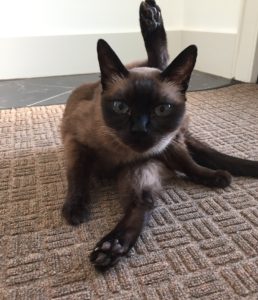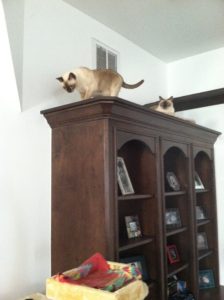Cats Aging Gracefully: Senior Cat Care

Hershey
Elderly Cats and the Aging Process – How can we help our cats in their old age?
Getting old is not for the weak of heart. Things don’t work the same, they don’t feel the same, and life becomes more challenging. Most people are probably used to living with some type of pain on a regular basis. We become so used to taking “stuff” to mask it that the thought of eliminating the cause doesn’t even cross our minds. I would guess this assessment is true for about 80% of the population. Sadly, our pets’ aging is resembling that of humans more and more. They’re developing the same diseases like diabetes, obesity, cancer, digestive disorders…
Does it really have to be this way?
NO! My goal is to help my kitties grow older gracefully. Despite Hershey being 15 years old, he still runs wind sprints up and down the stairs and hallways almost daily, and at night I can hear him vocalizing as he plays with his furry mice. He amazes me! His fur looks great, he’s got a lot of energy, and he hasn’t become a cranky old man yet. What’s his secret? An appropriate diet and exercise!
Feline Arthritis Symptoms – Does my cat have arthritis?
One of my friends, Denise, asked me this week if I could give her any recommendations for kitty elbow arthritis. Arthritis is an inflammatory condition of the tissue that lines the joints and tendons, most commonly in the elbows and hips. It can happen as young as age 6, especially if the kitty is obese, overweight or doesn’t exercise enough. Cats are stoic creatures of course, and try not to show when they are hurting or not feeling well. Therefore, you have to really pay attention to your cat’s behavior. A few of the warning signs may be:
- Reluctance to jump on to things
- Avoiding climbing in and out of the litter box
- Keeping to herself more
- Sleeping more or becoming less active
- Loss of appetite
The first thing to do is rule out an illness or disease with your vet. After that, prevention is always easier and less expensive than treating a condition, so here are a few suggestions:
- Make sure your kitty eats a species appropriate diet. Cats are obligate carnivores so including raw meats, organs, and bones or a commercial raw food or freeze dried food would be ideal. The next best thing would be high quality canned, grain-free wet food. (Hint: you won’t find this at the grocery store) The closer your cat’s diet resembles something that cats in the wild would eat is going to provide her with the best chance for optimal health.
- Make sure your kitty gets exercise. Whether you carve out play time every day or create ways for your cat to be more active, movement is key. Check out Aylen’s exercise video below! She’s loves to exercise and play.
- Don’t leave food out all day for your cat to graze on. Because most cats sleep 16 hours a day, do you really think they need extra snacks? This just leads to cats becoming overweight and obese.
- Maintain a healthy weight in order to protect their joints.
- Ditch the kibble. Kibble is one of the worst things you can feed your cat–or even your dog if you have one. The heat process in manufacturing produces acrylamides, which are known carcinogens (cancer-causing). Plus, kibble contains starches and grains which promote inflammation. You may as well send personal invitations to the host of illnesses and diseases pets contract.
- Avoid unnecessary re-vaccinations. Ask for a titer test instead to determine if immunity is still present or not. If your kitty lives indoors only, there’s no need to risk their health with annual vaccinations. Period.
Expert advice
Dr. Karen Becker, DVM, provides some great insight and advice when it comes to feline arthritis.
There are many wonderful natural feline arthritis treatments and remedies for this condition that can reduce or eliminate the need for painkillers, many of which are highly toxic to cats. Some of the therapies I’ve used successfully with arthritic cat patients include:
- A high-quality omega-3 supplement (I recommend krill oil)
- Veterinary chiropractic care for your cat, which can be very effective in alleviating pain and reducing joint degeneration
- Massage to reduce inflammation and pain in damaged tissues
- Acupuncture, which cats tend to tolerate extremely well
- Adequan Canine injections to stimulate joint fluid
- Glucosamine sulfate, MSM, and egg shell membrane
- Homeopathic remedies (Rhus tox and Arnica are two common remedies used for arthritis, but there are many others depending on your cat’s symptoms)
- Ubiquinol and turmeric
- Supergreen foods, such as spirulina and astaxanthin
- Natural anti-inflammatory formulas (herbs, proteolytic enzymes, such as Wobenzym®, and nutraceuticals), as well as TCM (traditional Chinese medicine) formulas
- EFAC complex (Esterified Fatty-acid complex) an oral supplement or topical cream
- Laser therapy and the Assisi loop
 So many choices? How do you know which is the best for your kitty? My first go-to is to muscle test products to determine what the cat’s body needs. Working with a veterinary homeopath or a holistic or integrative veterinarian can help narrow down protocols and provide ongoing assessments. Instead of wasting time watching countless hours of TV, spend some time reading labels and looking at brands’ websites; read articles written by holistic vets like Dr. Becker so you can make informed decisions when it comes to the health of your cat. In the end you’ll be smarter and more knowledgeable about choosing products for your cat. 😺
So many choices? How do you know which is the best for your kitty? My first go-to is to muscle test products to determine what the cat’s body needs. Working with a veterinary homeopath or a holistic or integrative veterinarian can help narrow down protocols and provide ongoing assessments. Instead of wasting time watching countless hours of TV, spend some time reading labels and looking at brands’ websites; read articles written by holistic vets like Dr. Becker so you can make informed decisions when it comes to the health of your cat. In the end you’ll be smarter and more knowledgeable about choosing products for your cat. 😺
How can I help your cat?
Is your cat suffering from feline arthritis like symptoms? Are you looking for some natural remedies or supplements to help alleviate or reduce the pain? Let me know how I can help your cat! Submit a comment below.
Please share this post on your favorite social media channels if you have friends who are passionate about cats! You can also sign up here if you want all our posts to go straight to your inbox.

